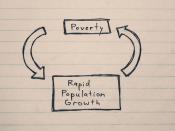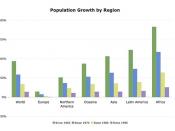Inevitably the world's population is getting larger; however the earth itself is not getting any bigger. The population's rate is drastically increasing. In 2000, the world had 6.1 billion human inhabitants. Today that number is significantly increasing. Scientists believe that there will be over 9 billion people with in the next 15-20 years. With so many people coming into the world questions arise if society can provided all these people with jobs, housing, food and other necessities.
In the year 2000, the growth rate was 1.4 percent, when applied to the world's 6.1 billion population, yields an annual increase of about 85 million people. Because of the large and increasing population size, the number of people added to the global population will remain high for several decades, even as growth rates continue to decline. Many scientists do not see a concern for these numbers. However, others believe that if this rate continues then there shall be mass amounts of poverty and famine.
With an increasing population comes the demand for new housing. Industrialization is becoming so large that it is seeping into our natural areas that should be preserved. People are also living much long then they used to. Advances in medical technology have increased society's life expectancy rate. In 1789, Thomas Malthus studied the nature of population growth in Europe. He claimed that population was increasing faster than food production, and he feared eventual global starvation. Of course he could not foresee how modern technology would expand food production; however there is so much famine and poverty in the world today. Technology can not provide food for all the starving people, but the population rate is still growing.
Between 2000 and 2030, nearly 100 percent of this annual growth will occur in the less developed countries in Africa, Asia,



WoW!!
For High School level; this paper is interesting to read and yet it is also well thought out and constructed. Kuddos! GREAT job!
0 out of 0 people found this comment useful.